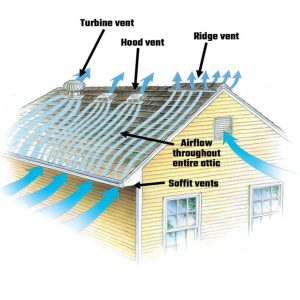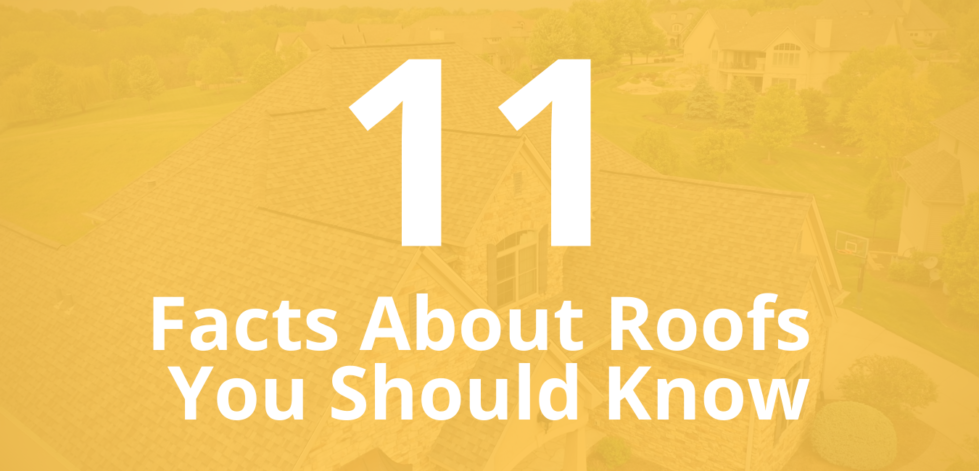On a count of 3 tell me some facts about roofs. 1…2..3…. Ok, you probably said it protects my home. You may have mentioned that it is durable. How about there are different types of roofs. You are absolutley correct on all of those. However there are more to a roof than meets the eye. Below are 11 Facts about roofs that you need to know.
1. The Earth Is Not Flat And Neither Is A Flat Roof
Flat roofs are called flat because they aren’t curved or sloped. They make look flat, but they are not. Standing on it you may not notice, but in order to direct water off the roof, a flat roof will have a slight slope that normally measures at least ¼ inch per foot. It’s not much of a curve, but it’s still there.
2. You Can’t Cover An Existing Roof
Many people believe you can put roofing material on top of roofing material to stop leaks. This might be a quick fix, but it does not address the underlying issues that haven’t been dealt with. A roof that is double-layered, adds more weight onto the structure and hides the damage. The hidden damage will get worse over time and cause more issues and cost more money.
3. A Roof Is Made Of More Than Wood And Shingles
All you may see are wood shingles, but there are several layers to a roof, if it is done properly. The roof decking supports the weight of the entire roofing system, which means it has to be durable and sturdy. There’s a water or ice barrier, which helps prevent damage from ice damming if you live in a climate that snows in winter. There’s also a waterproof membrane, metal flashing, drip edge, shingles and ventilation. Although you only see shingles and wood, there’s more than goes into building a roof than meets the eye. Each component is necessary and performs a specific function.
4. Roofs Need To Breathe
All roofs need ventilation. The flow of air underneath the roof deck is critical for the rest of the roofing system. If your roof is adequately ventilated, it will allow warm and moist air to escape and cooler air to come into the attic. The ultimate goal is that the temperature and humidity levels in the attic space match the conditions outdoors.

5. You Can’t DIY A Roof
Despite what you may see in the DIY culture that we have, replace and repairing a roof require certain skills and needs to be done by professionals. Firstly, you need permits and licensing to work on a roof. Secondly, the roof is a very complex system of constructed layers, and these layers need to be installed by a professional who knows what they’re doing. If you DIY your own roof, you might get hurt or cause more damage to the roof, walls, attic, electrical systems and wooden frames. You might as well skip the part in the middle where you try to DIY, and call in a professional roofing contractor.
6. You Can Actually Get Your Roof Cleaned
Your roof is open to the elements, so of course, it gets dirty. Most people know that sometimes gutters and downpipes need to be cleaned, but not the roof. The fact of the matter is that often things like moss, algae and fungi grow on roofs, and can go unchecked for years. Fortunately, there are businesses which specialise in cleaning roofs with techniques, products and tools that don’t damage shingles or roofing systems.
7. Your Roof Can Last Longer Than How Long You’ve Lived Under It
The typical lifespan of a roof that’s been maintained well, and has been constructed with high-quality materials is between 20 – 30 years. Some roofs, such as shake style shingle roofs, can last almost 50 years. Therefore, your roof could very well last longer than you do in your own home. However, if you leave it to go to ruin, you might have to replace it sooner.
Roofs are essential to the home, which is why they should be looked after. Constructed out of various complex and necessary systems, your roof has more to it than being a structure that keeps you dry. When the time comes for a new roof to be installed on your home, make sure you check the warranty on it and get with a Company like Aspen Contracting that offers a Lifetime Warranty.
8. A Faulty Roof Can Decrease The Resale Value Of Your Home
Leaky roofs or roofs with damage can cause issues not only while your living in your home, but when you decide to sale your home. If you are planning on selling your home or purchasing a new one, the condition is going to determine the amount of money you pay as well determine how safe you feel in the home. No one wants to purchase damage goods , so why would you buy a house with a damaged roof? Unless you are willing to offer a huge discount on the selling price, you may want to get the roof looked at by a professional.
9. Your Type Of Roof Depends On Where You Live
You don’t always get to choose the roof you want for your home. For some places, certain types of roofs are used because they work better in the area’s climate. For colder and wetter climates, gable roofs are best as snow and water can slide off to the ground. On the other hand, you’ll see flat roofs more often in areas that don’t get much rain at all. If you are having a house built in a hot and humid climate state like Tennessee, then your Nashville roofing contractor might suggest an asphalt shingle roof as an option for keeping your home cool. Your local roofing contractor may have better roofing options for you to choose from that would suit where you live, even though you might have something else in mind.
10. Your Roof Could Be Good For The Environment
Environmentally friendly roofs are the new trend. One of the most popular of those are the “cool roofs”. Cool roofs are environmentally friendly and reflect infrared and UV rays from the sun away from the building. This makes the building cooler, curbing energy consumption and reducing your energy bills. They also reduce air pollution and greenhouse gases by lessening how much heat is radiated into the atmosphere.
11. You Should Inspect Your Roof After Every Six Months
Most of the time, homeowners do not notice the issues with their roofs until it is too late. At this moment, repairs are expensive and may even require the removal of the entire roof.
However, if you ensure that your roof is inspected after every six months, you will escape costly repairs, and you will be certain that you are living in a safe environment. The inspections may be more frequent depending on the weather of the area.
Those are our 11 facts about roofs that we think you should know. If you have questions please send us a message via our contact page or give us a call at 877-784-ROOF!


0 Comments